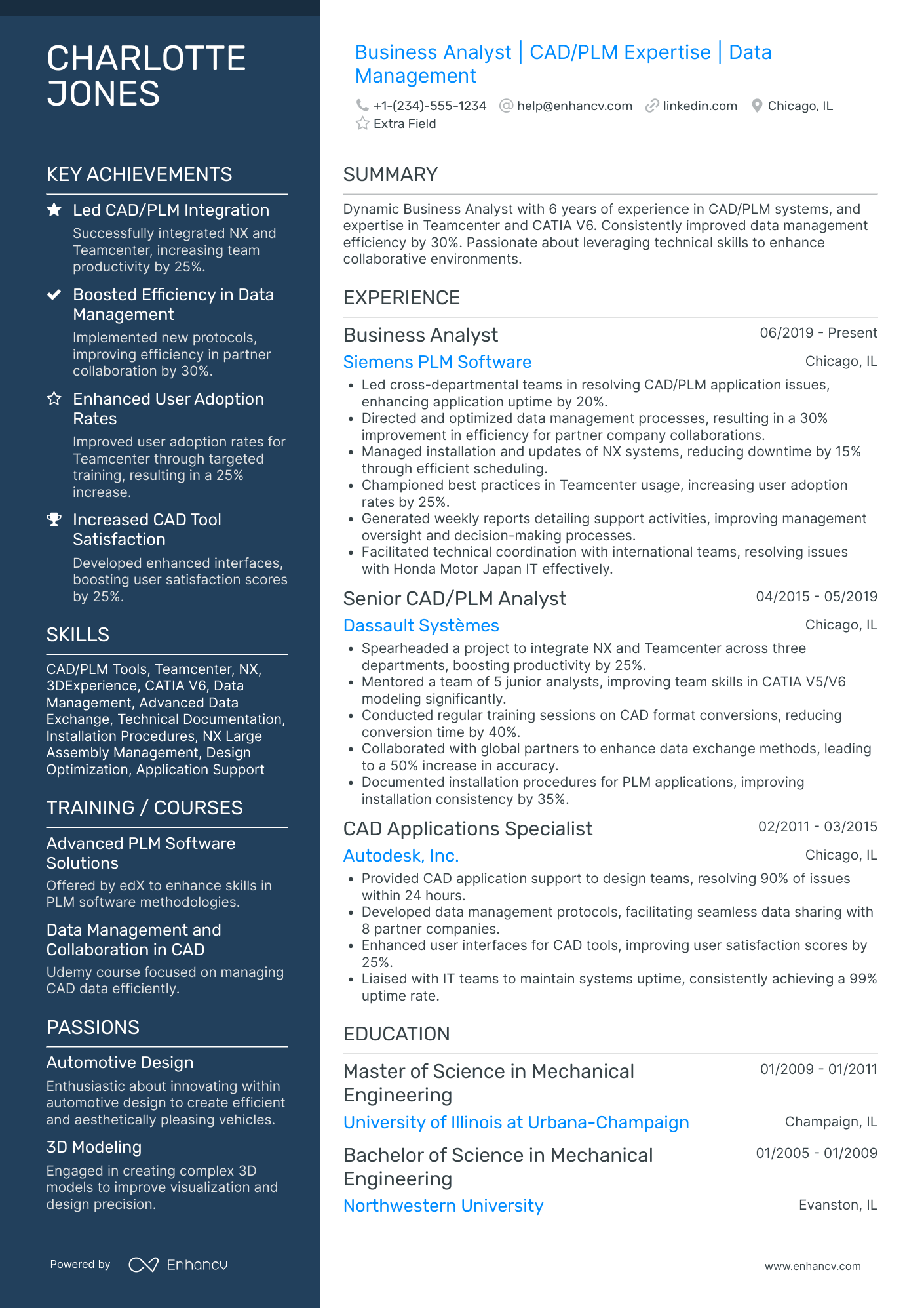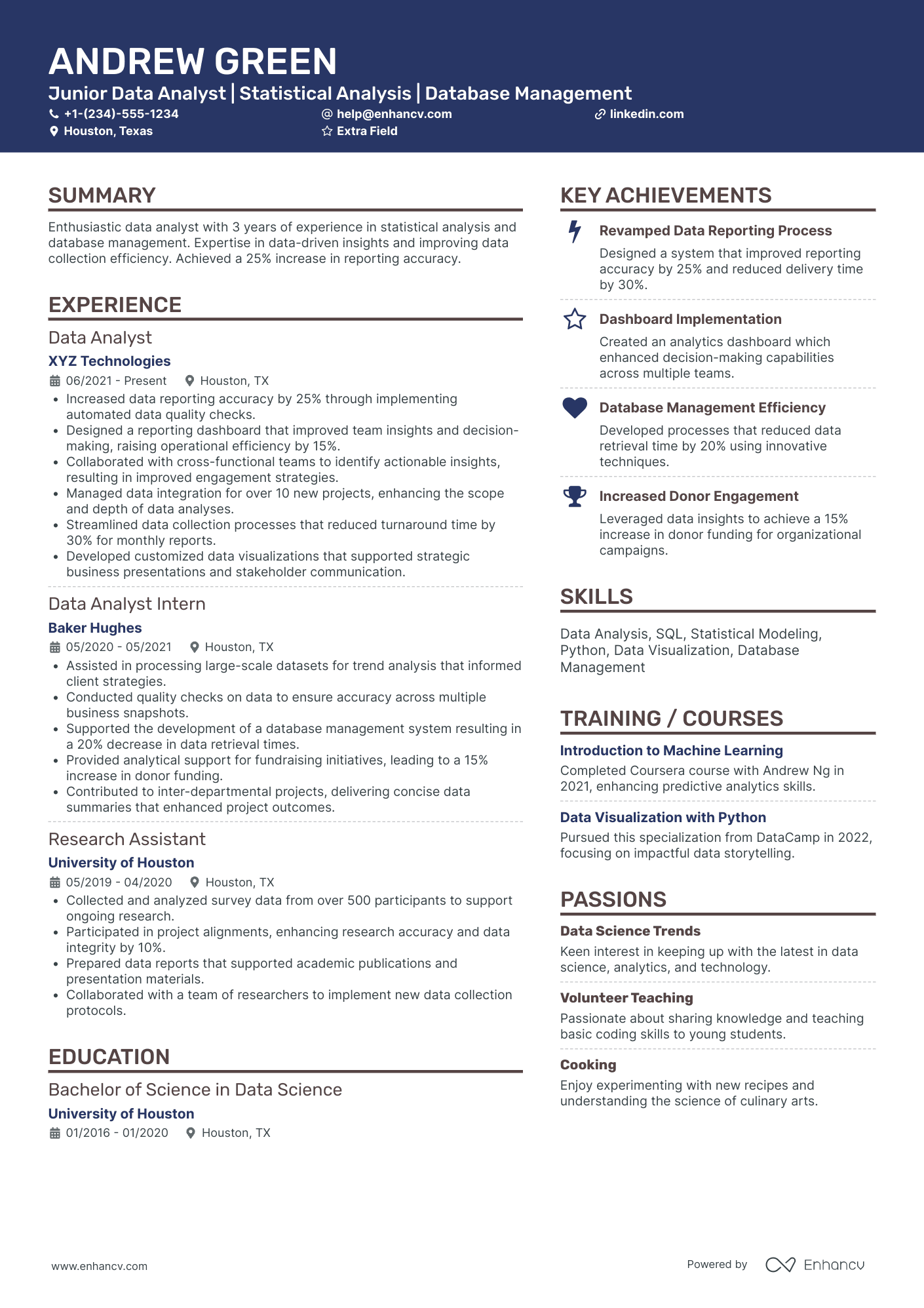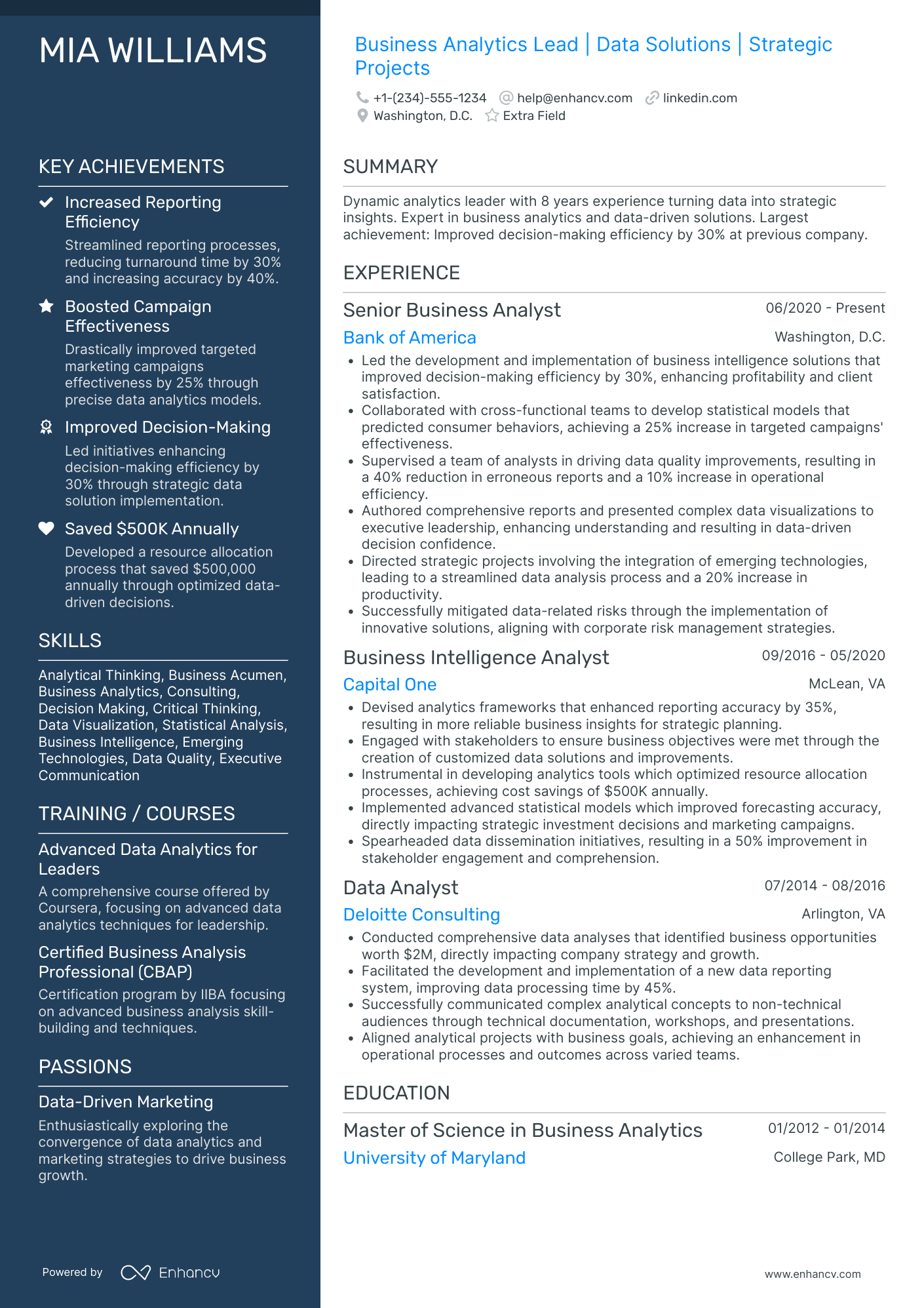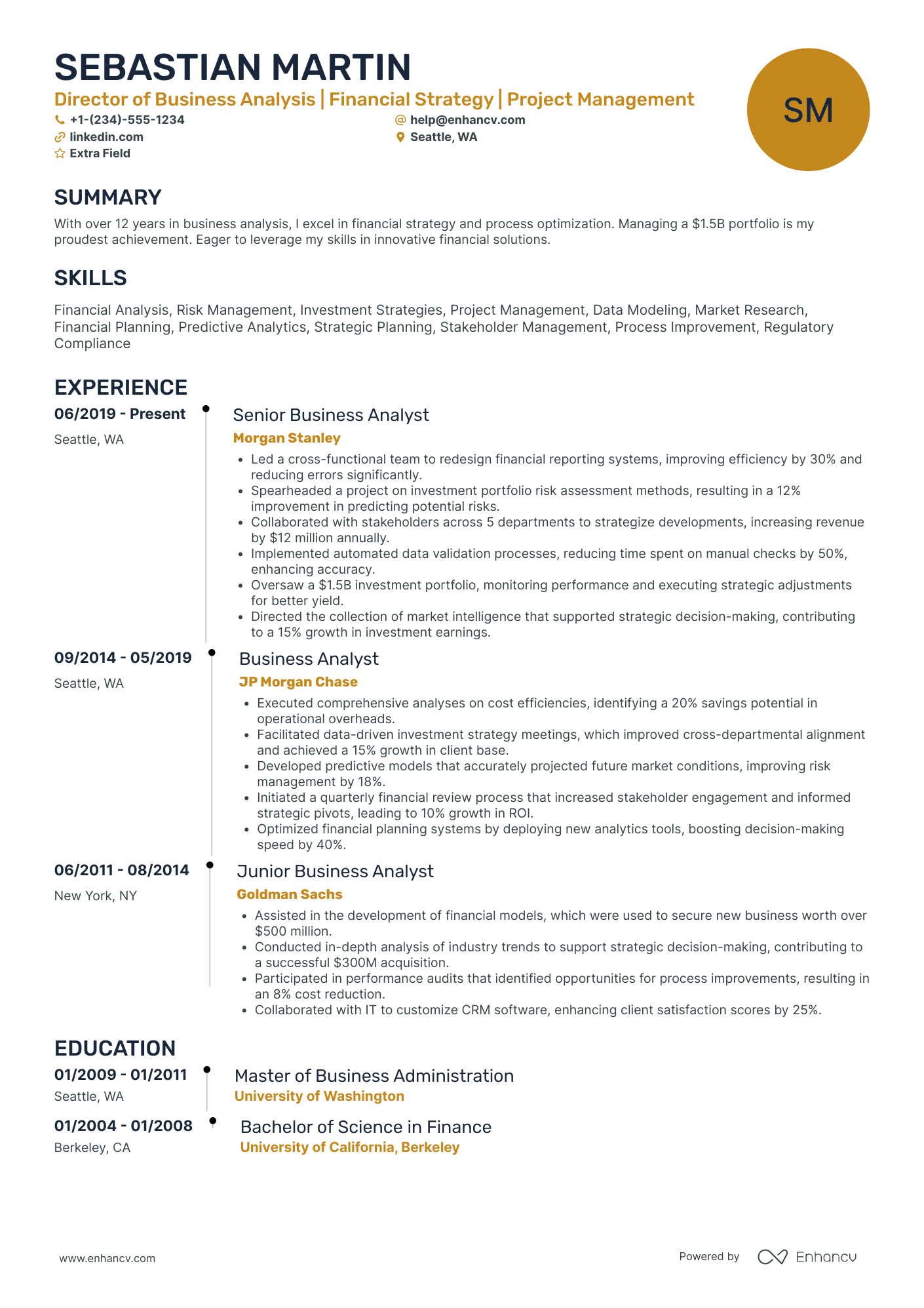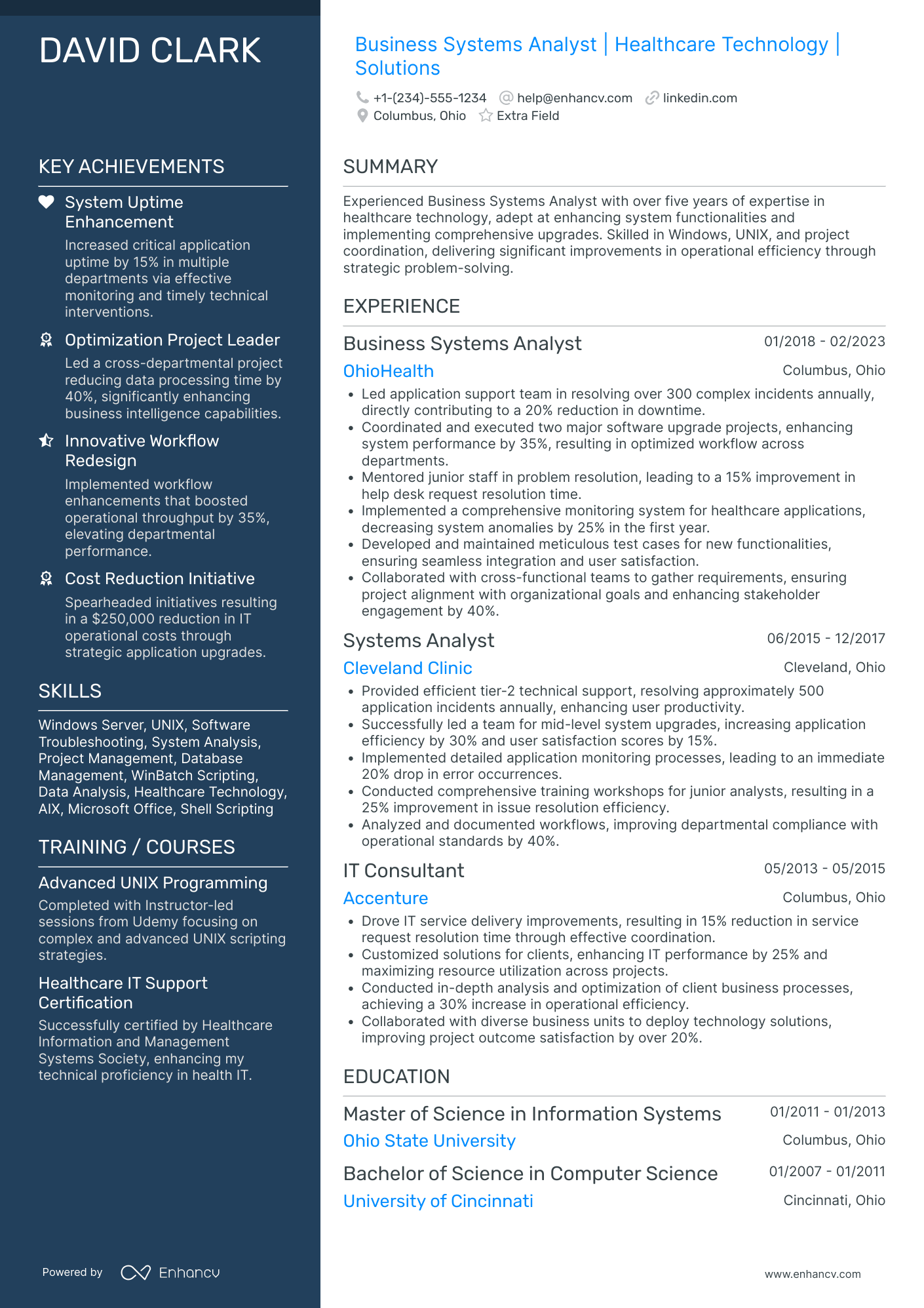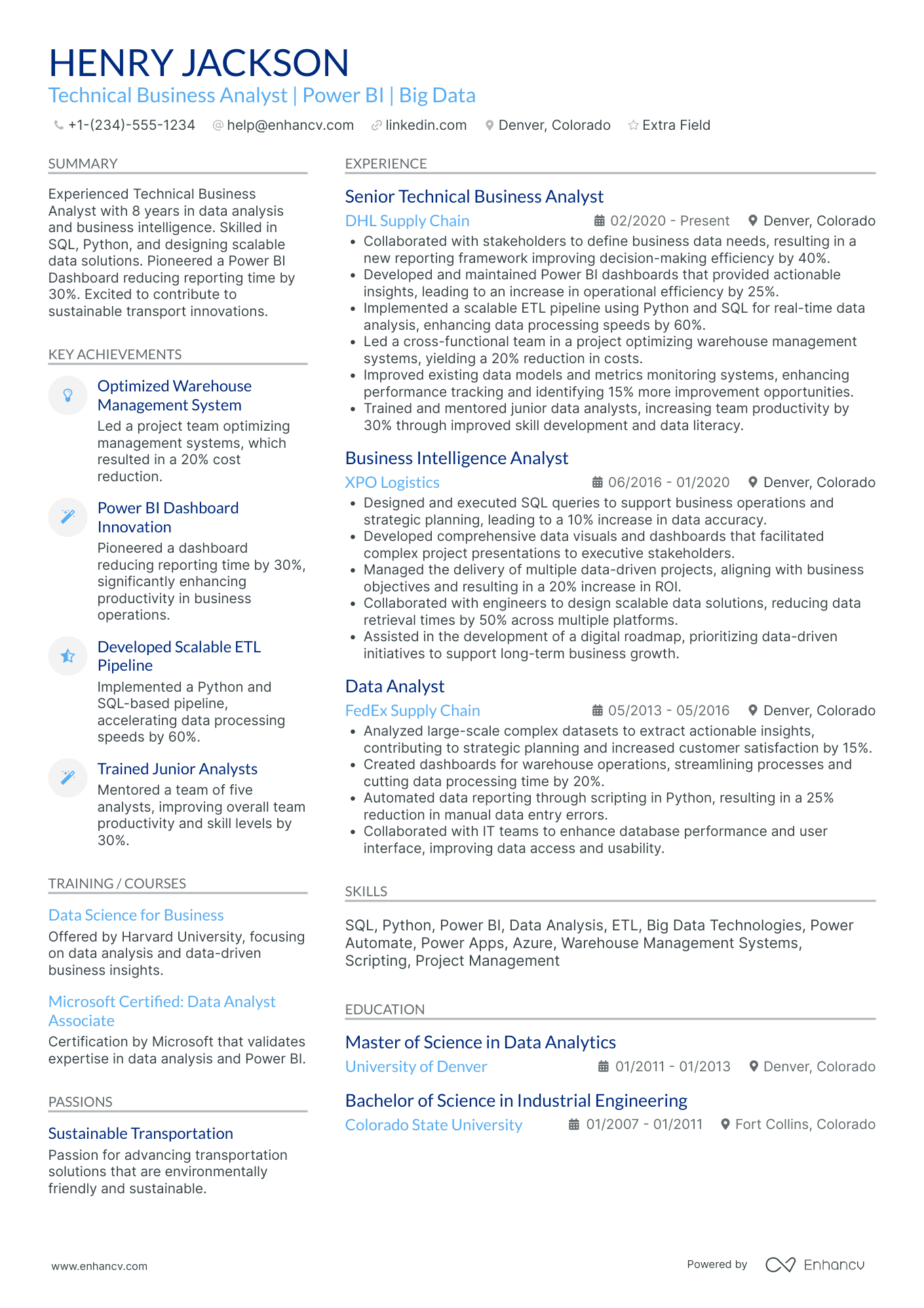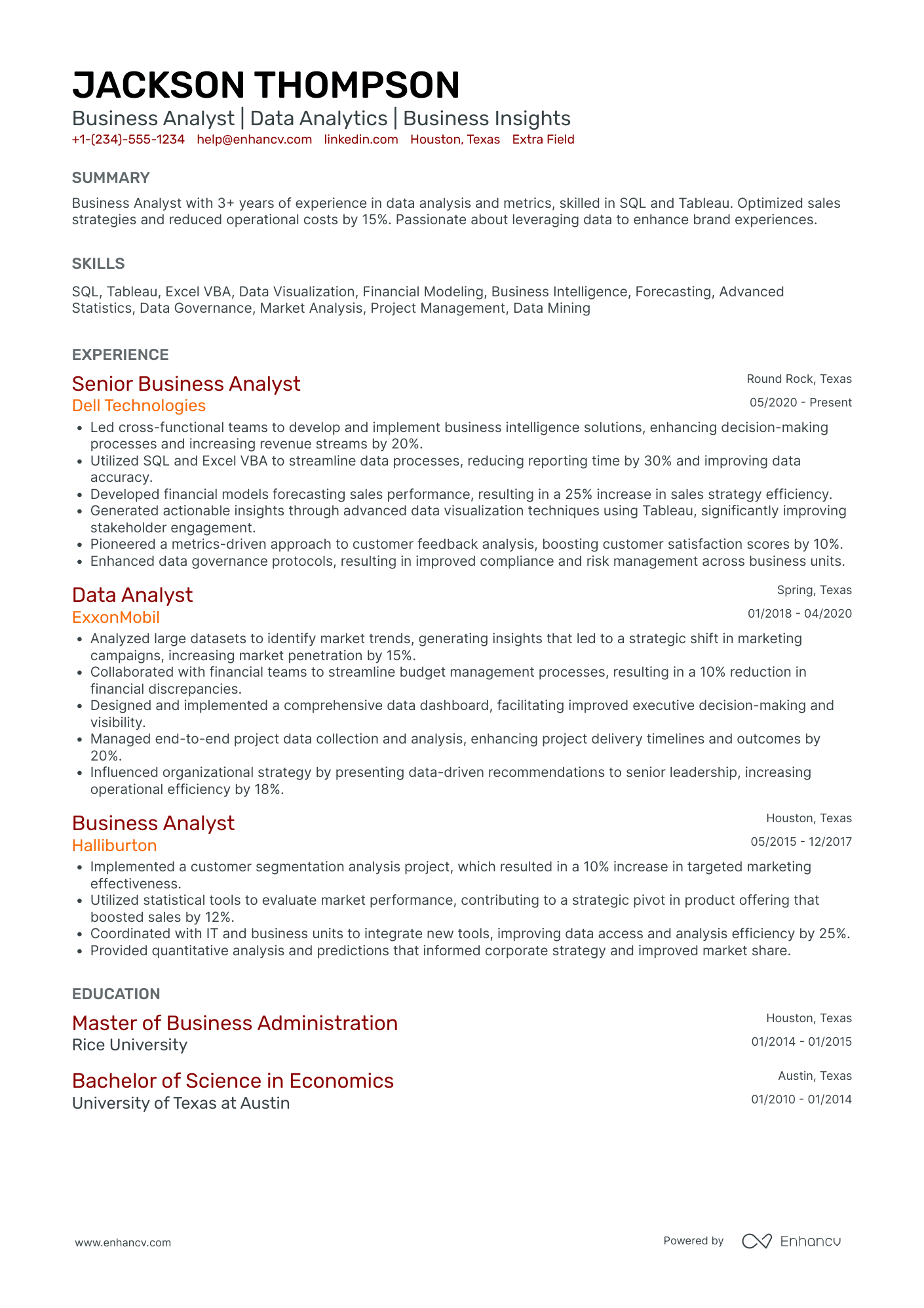How to write a great business data analyst resume
It’s been said that “the world’s most valuable resource is no longer oil, but data.” That means the person who can refine that data is one of a company’s most valuable employees.
That’s why companies have high expectations for business data analysts.
Good business leaders know that data tells a story. Sometimes it’s a story of triumph like increased profits.
Other times it’s not that positive.
You’re the data storyteller that they need. That’s splendid, but does your business data analyst resume back that up with data? Here is a guide on how to write a resume. And concider the format you are going to use after you read this article. You might want to go with a Functional skill based reusme or a reverse-chronological resume, depending on your strong sides. And last but not least, pick a resume format that looks good and makes you look good.
Your resume must show that you are an expert at tools like analytical software. At the same time, it must prove that you have the ability to understand data and explain it to others.
Recruiters will scrutinize your resume to see if you have:
- The experience at using data to spot trends and problems
- Technical skills needed to mine the data
- The ability to communicate what you find
It’s easy for them to reject your resume if it doesn’t give them that data.
That’s why we’re going to show you how to win them over with your business data analyst resume.
What you will learn from this business data analyst resume guide:
- 8+ business data analyst resume examples that show your broad qualifications
- How to balance technical skills with soft skills like communication
- Ways to highlight your knowledge of the industry
- How to showcase your education, certifications, and achievements
Looking for related resumes?
How to write a fact-filled business data analyst resume
You spot the trends in data and alert company officials so that they can make the best decisions.
You must show it on your resume.
Data helps companies know more about their customers. Data on its own is useless without someone who can gather and shift through it and find the trends within it.
Your resume should show that you can collect the data and organize it into reports.
Include technical skills like manipulating and presenting data with software like R Programming and Microsoft Excel and using structured query language.
Showcase soft skills like communication, problem-solving, research and attention to detail.
How did you prepare reports and communicate what you found with company officials?
Hiring managers want to know your business data analysis accomplishments.
Include how your analytical work saved the company resources, increased sales or improved relationships with customers.
Whatever you do, make sure your business data analyst resume matches the job’s industry and especially the job posting.
Do they need someone to prepare cost-benefit analysis? Are they seeking a candidate who can use Microsoft Flow to automate repetitive tasks?
Center your resume around the needed qualifications.
Here's what a recruiter wants to know.
- Which data analysis programs and tools are you experienced or certified in?
- How do you communicate your findings with decision makers?
- What are your data analysis strengths and why do you enjoy analyzing data?
- How will you solve their business data analysis challenges?
The most important sections of your business data analyst resume:
- Detailed resume header
- Resume summary
- Resume experience
- Education and certifications
- Technical and soft skills
Each resume section should present data that will earn you an interview. Show how you are the best fit for their company.
Let’s break up how into easy-to-follow steps.
Make your business data analyst header count
The header’s just where you put your contact information. There’s no reason to stress over it, right?
Think again.
Your header looks like this:
It’s not wrong necessarily, but it’s very generic. The hiring manager may think you just copied the header off an old resume.
You want to make a good impression right at the start.
Let’s make a few changes.
Recruiters know that you are a senior level analyst. Having professional links like a website and LinkedIn account gives you added credibility.
Be specific on your business data analyst resume
There is an insurmountable number of uses for data. Luckily companies don’t expect you to have mastered every use.
Job postings for business data analysts and related fields are often specific about their needs.
For instance, a job posting for a strategic business analyst needs an analyst to identify business opportunities that can improve marketing, call center, and sales strategies.
Make a lists before you start writing your business data analyst resume. Include as much data about your experiences as you can.
Information to list includes:
- Numbers like how many reports you managed and how often
- Details about your employer like how many customers it served
- Specific duties you held like performing daily data queries and preparing reports
- Experience in technical skills like coding with Python
- Accomplishments like increasing profits by 15 percent
When you list skills and experience using tools like Python, add how many years of experience you have using each tool and analysis method.
Having this information ready will help as you write your business data resume summary and experience sections.
Pitch your strengths in your business data analyst summary
We produce an estimated 2.5 quintillion bytes of data each day.
This data can help companies improve quality, eliminate costs and build trust.
It takes a business data analyst to help put that data to work. Your resume must prove that you’re the analyst that can do so.
That doesn’t mean take all the data that you have on yourself and cram it into your resume. Select the data that most closely fits the job description and requirements.
Weave your quantitative data and keywords from the job posting into your business data analyst resume summary section.
This is not the way to do it.
This won’t make you stand out among the job candidates. This is why:
- It is not specific about how much experience the candidate has.
- What kind of technical expertise? There are no examples.
- How did this candidate benefit the company?
- It is too generic and sounds like any other candidate.
Let’s be more specific and see what the result can be.
This summary is better. For example, it refers to tools that the analyst uses. It also gives how many years of experience that the candidate has.
Let’s try one more and look at this data analyst resume summary.
This example includes not only tools that the analyst used but also quantifies how often the analyst prepared reports and how the reports were used.
A nice addition would be if the analyst’s work led to achievements like a 23 percent increase in viewership. You should always include statistic like that in numbers in your resume, if you have somehting to brag about.
Pro tip
Your summary should act as an elevator speech, briefly promoting how you will benefit the employer if hired. Pitch your strengths in the summary and expand on them in your business data analyst experience section. Give examples like how your work benefited each employer.
Optimize your resume summary and objective for ATS
Drop your resume here or choose a file.
PDF & DOCX only. Max 2MB file size.
How should you promote your business data analysis experience?
Your business data analyst resume experience section is where you get into the details of how you analyze data to improve companies’ bottom line.
A recruiter will want to see that you have experience using tools and methods like Tableau and SQL that are widely used in the industry.
At the same time, the recruiter wants to see examples of how you interpreted and explained the data that you found.
Can you tell stories with data that drive business decisions?
Business leaders demand clear explanations so that they can put the data to work. They need to know that you can deliver that information before they put you to work.
Their posting will often include specific needs like experience directly interacting with clients. Pay very close attention if you read phrases like, “What you need to succeed in this role.”
Select keywords from these sections and make sure they are in your experience section and throughout your resume.
What makes one example of your experience more powerful than another? For instance, is it any more special to be able to use visualization tools like Tableau as it is to mine for data?
The most powerful experience is experience that matches the job posting.
When explaining past roles, here are examples of the data that you may want to include:
- What company goals did you accomplish?
- How did you achieve these goals?
- What tools and processes did you use?
- What were the quantitative results of your work?
Let’s look at some business data analyst resume experience sections.
- •Complete, review and analyze client audits
- •Gather information and requirements from new clients, analyze practices and map out improved processes
- •Clearly communicate all audit findings, assessment reviews, and partnership guidance back to Sales and Account Management
- •Deliver engaging, informative, well-organized presentations to C-Suite executives
This sounds like a textbook explanation of what a business data analyst does. It doesn’t deliver anything unique that would convince a recruiter to invite you to an interview.
It does not say what tools the analyst used or how the analysts’ work benefited the company.
Let’s look at another example.
- •Met with clients to understand problems, build specifications and sell proposals
- •Delivered a Chatbot project, which successfully understood the user behavior and increased lead conversion
- •Led a project to simplify software deployment. The result successfully reduced deployment costs by 94%
- •Delivered business intelligence dashboards and trained users in loco on SAP tools
- •Head and co-creator of the company’s finance business intelligence dashboard
A version like this shows not only your strengths but your accomplishments as well.
If you were applying for a job in which you had to analyze user behavior, your resume would show the company you already have the experience.
How to describe duties of a business data analyst on a resume
Much of proving you have the right experience to a recruiter is showing that you have experience similar to the job you want.
Here are some work experience responsibility samples that may fit your business data analyst resume:
- Analyzed data to spot trends, make forecasts and extract information
- Utilized Microsoft SQL Server for extraction and analysis of data from multiple sources
- Developed reports and dashboards using Tableau for internal and external customers
- Crafted compelling stories and transform data into insights that address key client issues
These duties both lead into the technical skills that you need as well as soft skills like the ability to communicate clearly.
How do you write a resume for a job that requires experience when you lack experience? Entry-level business analysts come from a variety of other occupations including IT and other types of data analyst positions. You might want to read our post on how to write a resume without work experience. It might help you score an entry-level job.
Possible ways to close the gap on your resume include:
- Explaining how your education led to real-world experience
- Showing connections between your past work and the job that you want
- Including mentorships and apprenticeships that gave you data analysis experience and education
- Including accomplishments in fields like data scientist and financial analyst that may be equally impressive in business data analytics
Does your business data analyst resume need an education section?
Experience matters a lot to recruiters when it comes to hiring business data analysts. So does education.
Business data analysts must know how to use different types of data-analytics software like RapidMiner and Tableau. Many job postings suggest experience using Python.
Hiring managers may want candidates with a bachelor’s degree in business, management, economics, computer science or other similar fields. They may want candidates with a Master of Business Administration. So if you have any of those, make sure you list them in your education section.
College isn’t the only way to learn needed skills. Certifications can also provide that education.
How to include certifications on your resume
Certifications can convince hiring managers that you are a valuable candidate. The catch is they have to be professional industry-approved certifications.
Certifications prove that you have the knowledge to complete specific task or have specific skill sets. Often they may involve software such as Microsoft products that you may be using.
A few popular industry-approved data analytics certifications are:
- Microsoft Certified Solutions Expert (MCSE)
- SAS Certified Data Scientist
- EMC Proven Professional Data Scientist Associate (EMCDSA)
- MCSA: SQL 2016 BI Development
- Tableau Desktop Certified Professional
Be sure to list industry-approved certifications.
Your education is important. So are the skills that you learned.
What business data analyst skills do recruiters want to see in your resume?
Business data analysis requires plenty of skills past making a spreadsheet.
For instance, decision-makers rely on you to gather and analyze data. They also count on you to explain it.
That’s why communications is near the top of the needed skills list.
Look at the job posting to see exactly what your duties would be if hired. List the skills that show you can do the work.
Will you need to do regression analysis? Using Minitab statistical software and Excel are skills related to that task.
If you have those skills, put them on the list.
You should be proficient in skills like creating spreadsheets and using databases to gather your information. Statistical programming and skills using SQL are also valuable.
Basic types of skills that you need include:
- Analytical
- Communication
- Computer
- Mathematical
- Decision making
- Organizational
15 technical skills to include on a business intelligence resume
- Data warehousing
- Data mining
- Data modeling
- SQL
- Python
- SAS
- Tableau
- Scripting
- Statistical analysis
- Project management
- Oracle database
- Data visualization
- Microsoft Excel
- Hadoop
- C#
Top ways to make a terrific business data analyst resume
These resume tips that we shared should help you build a solid business data analyst resume.
Points to remember include:
- Use information in your resume that matches the job description.
- Be as specific as possible when listing what skills and tools you use.
- Explain how you learned your skills
- Promote your ability to tell stories with data
Business Data Analyst resume examples
By Experience
By Role
